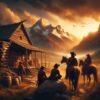Riders of the Frontier: Embarking on Western Journeys
The Wild West, with its sprawling landscapes and untamed wilderness, has long captured the imagination as a land of adventure and exploration. “Riders of the Frontier: Embarking on Western Journeys” delves into the experiences of those who ventured into this vast and often hostile terrain. Whether driven by the pursuit of fortune, the desire for new beginnings, or the quest for adventure, these journeys embody the spirit of exploration that defined the frontier era. By exploring the challenges, triumphs, and motivations of these early travelers, we gain insight into the enduring allure of the American West and the stories that continue to captivate our collective imagination.

Part 1: The Call of the Frontier
The Allure of the West: Dreams of Adventure and Opportunity
The frontier was a land of boundless opportunity and adventure, drawing individuals from various backgrounds who were eager to carve out new lives for themselves. For many, the West represented a chance to escape the constraints of civilized life, seek their fortunes, or start afresh. This allure was fueled by the promise of abundant land, natural resources, and the possibility of wealth. The dreams of adventure and opportunity were central to the motivations of those who set out on Western journeys, reflecting a broader desire to explore and exploit the untamed expanses of the frontier.
Motivations for Exploring the Frontier
The reasons behind embarking on a Western journey were as varied as the individuals who undertook them. For some, the drive was economic—seeking gold, silver, or fertile land for farming. Others were motivated by personal reasons, such as escaping past troubles or starting anew after personal losses. The allure of exploration and discovery also played a significant role, with many driven by the desire to chart unknown territories and experience the grandeur of the American West firsthand. Understanding these motivations provides a deeper appreciation for the diverse and often complex reasons that led people to venture into the frontier.
The Spirit of the Frontier: Courage and Resilience
The spirit of the frontier was characterized by courage and resilience, qualities essential for those who undertook the challenges of Western journeys. The vast and often harsh landscape presented numerous obstacles, from treacherous terrain to unpredictable weather conditions. Travelers had to rely on their resourcefulness, endurance, and adaptability to overcome these challenges. The courage to face the unknown and the resilience to persevere through difficulties were defining traits of those who embraced the frontier spirit, shaping their experiences and contributing to the legacy of Western exploration.
Part 2: The Journey Across the Frontier
The Challenges of Western Travel
Traveling across the frontier was fraught with challenges, both physical and logistical. The vast distances, rugged terrain, and lack of established infrastructure posed significant obstacles for early explorers. Wagon trains, which were often the primary mode of transportation, faced difficulties such as difficult river crossings, harsh weather conditions, and the threat of disease. The journey required meticulous planning, cooperation among travelers, and the ability to adapt to unforeseen circumstances. Understanding these challenges highlights the determination and ingenuity required to navigate the frontier successfully.
Navigation and Survival Skills
Survival on the frontier depended heavily on a variety of skills, including navigation, hunting, and first aid. Navigating the often unfamiliar terrain required a keen understanding of landmarks, weather patterns, and the use of maps and compasses. Hunting and foraging were essential for securing food, while knowledge of local flora and fauna was crucial for health and safety. First aid skills were vital for treating injuries and illnesses, given the limited access to medical care. These skills, along with the ability to improvise and adapt, were key to enduring the trials of Western travel and ensuring a successful journey.
Encounters with Native American Tribes
Encounters with Native American tribes were a significant aspect of many Western journeys. The interactions between settlers and indigenous peoples were complex and varied, ranging from cooperative trade relationships to conflict and hostilities. Understanding the cultural and social dynamics of these encounters provides a more nuanced view of frontier life. Respectful and mutually beneficial interactions often led to productive alliances, while misunderstandings and conflicts could result in tension and violence. The experiences of travelers and settlers highlight the diverse and often challenging nature of these encounters.
Part 3: Settling the Frontier
Establishing New Communities
As travelers completed their journeys, many sought to establish new communities and build lives in the frontier. Settlements ranged from small farming communities to bustling towns and cities, each shaped by the needs and ambitions of its founders. Establishing a new community required a range of activities, from building homes and businesses to organizing local governance and social institutions. The process of settlement was marked by collaboration and perseverance, as new arrivals worked to create stable and thriving communities in the midst of the wilderness.
The Impact of Settlement on the Landscape
The process of settlement had a profound impact on the landscape of the frontier. As communities expanded and developed, the natural environment was altered to accommodate human activities. This included the clearing of land for agriculture, the construction of roads and infrastructure, and the establishment of commercial enterprises. The transformation of the landscape reflected the changing dynamics of frontier life and the broader process of American expansion. Understanding these impacts provides insight into the ways in which settlement shaped the development of the West and the challenges of balancing progress with environmental considerations.
The Legacy of Frontier Settlements
The legacy of frontier settlements is reflected in the towns, cities, and cultural heritage of the American West. Many of the early settlements evolved into significant centers of commerce and culture, contributing to the growth and development of the region. The historical and cultural significance of these settlements is preserved through historical sites, museums, and local traditions. Exploring the legacy of frontier settlements highlights the enduring contributions of early pioneers and the lasting impact of their efforts on the development of the West.
Part 4: The Enduring Appeal of Western Journeys
The Romanticism of the Frontier
The romanticism of the frontier continues to captivate the imagination, shaping how the Wild West is perceived and represented in popular culture. The image of rugged individualists, epic journeys, and the untamed wilderness evokes a sense of adventure and heroism. This romanticized view is reflected in literature, film, and other media, which often portray the frontier as a place of great challenges and grand possibilities. The enduring appeal of these portrayals highlights the fascination with the Wild West and its role in shaping American cultural identity.
Modern Interpretations and Revivals
Modern interpretations of Western journeys often involve revisiting and reimagining the experiences of those who ventured into the frontier. This includes historical reenactments, themed events, and educational programs that aim to bring the history of the Wild West to life. Contemporary media also explore the themes of exploration and adventure, often drawing on historical events and figures to create engaging narratives. These modern revivals contribute to a continued interest in the frontier and its legacy, reflecting ongoing fascination with the spirit of adventure and exploration.
Lessons from Frontier Journeys
The experiences of those who embarked on Western journeys offer valuable lessons about perseverance, adaptability, and the quest for personal fulfillment. The challenges faced and the achievements realized during these journeys reflect broader themes of human resilience and ambition. By examining the stories of frontier travelers, we gain insights into the qualities and values that defined the spirit of exploration and the impact of their endeavors on the development of the American West.
Preserving the Legacy of Western Exploration
Efforts to preserve the legacy of Western exploration include historical research, cultural initiatives, and the conservation of historical sites. Museums, archives, and educational programs play a role in documenting and interpreting the experiences of those who journeyed into the frontier. By preserving and sharing these stories, we contribute to a deeper understanding of the Wild West and its significance in American history. The preservation of this legacy ensures that the spirit of adventure and exploration continues to inspire future generations.
Conclusion
“Riders of the Frontier: Embarking on Western Journeys” offers a comprehensive exploration of the adventures, challenges, and legacy of those who ventured into the Wild West. From the motivations that drove individuals to seek new opportunities to the trials and triumphs of their journeys, this exploration highlights the enduring allure of the frontier and the spirit of exploration that defined the era.
By examining the key aspects of Western travel, settlement, and cultural impact, we gain a deeper appreciation for the historical and cultural significance of the American West. The legacy of frontier journeys continues to resonate with contemporary audiences, reflecting universal themes of adventure, resilience, and personal growth. The stories of those who embarked on Western journeys remain a testament to the enduring fascination with the Wild West and its role in shaping American identity.


